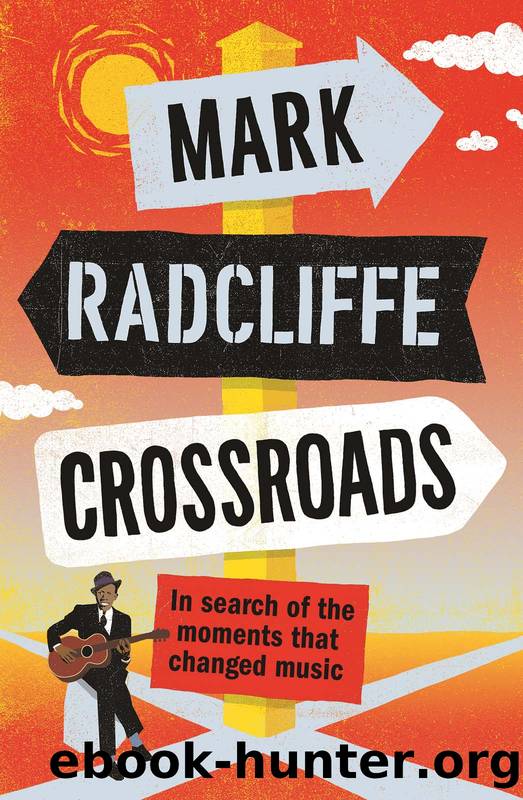Crossroads by Mark Radcliffe

Author:Mark Radcliffe [Radcliffe, Mark]
Language: eng
Format: epub
Publisher: Canongate Books
Published: 2019-07-22T16:00:00+00:00
13
Culture Clash
A turning point for British culture and society undoubtedly occurred when the Empire Windrush docked in 1948 and deposited hundreds of British Caribbean people on these shores to face uncertain futures, as recent news coverage has dramatically revealed. A musical crossroads was also reached as immigration meant that it was inevitable that styles and influences from other nations would start to infiltrate white radio and the charts. Before the first wave of West Indians arrived, what might loosely be described as ethnic or world music, which was originally a term invented to describe music of the developing world, was more or less unknown in the UK. But the impact of the Windrush Generation’s founders stepping ashore was felt immediately as newsreel footage was shot of the dapper, fedora-betopped, self-styled ‘calypso king’ Lord Kitchener singing ‘London is the Place for Me’.
As more immigrants followed from the West Indies more musicians inevitably arrived, and it was therefore no real surprise to see the Trinidad All Steel Percussion Band appearing at the Festival of Britain in 1951, which as we saw in Chapter 4 pointed the way to a brave new British world. Not least, one of racial integration.
The calypso became popularised as a satirical and comic song format on British television, thanks to the performances of the distinctly pale Lance Percival. All this helped to give what we might loosely call reggae a foothold in the collective consciousness and so it was perhaps inevitable that it would be the first ‘foreign’ sound to win widespread acceptance.
But it was a close-run thing. The fledgling hippie movement and search for a higher state of consciousness looked towards the meditational and musical techniques of India. As early as the summer of 1965, The Yardbirds were experimenting with sitar and tabla on ‘Heart Full of Soul’. The final version retained the tabla but eschewed the sitar in favour of Jeff Beck’s guitar imitating those distinctive drones. ‘See My Friends’ by The Kinks followed a month later and was clearly influenced by a trip to the subcontinent. By December, our old chums The Beatles were getting in on the act with George Harrison’s sitar on ‘Norwegian Wood’ from the Rubber Soul album. Harrison then went one better the following year, when Indian instruments and flavours dominated ‘Love You To’ on Revolver.
So ‘raga rock’ was making its voice heard. There was, however, very little music of authentic African origin in evidence, until a recording made by anthropologists in 1967 of the drummers of Burundi became a 1971 hit under the name of ‘Burundi Black’. We should also make note of Nana Mouskouri who had been exporting the music of her native Greece since the late Fifties. Originally from Crete but brought up in Athens, she has released well over two hundred albums in more than a dozen languages including Welsh, Mandarin, Hebrew and Corsican. It is almost impossible to be accurate but there are those who maintain she has sold more than three hundred million records. And all this with only one functioning vocal cord.
Download
This site does not store any files on its server. We only index and link to content provided by other sites. Please contact the content providers to delete copyright contents if any and email us, we'll remove relevant links or contents immediately.
| Biographies | Business |
| History & Criticism | Instruments |
| Musical Genres | Recording & Sound |
| Reference | Songbooks |
| Theory, Composition & Performance |
The Goal (Off-Campus #4) by Elle Kennedy(12433)
Kathy Andrews Collection by Kathy Andrews(10520)
Diary of a Player by Brad Paisley(6866)
What Does This Button Do? by Bruce Dickinson(5527)
Assassin’s Fate by Robin Hobb(5237)
Big Little Lies by Liane Moriarty(4880)
Pale Blue Dot by Carl Sagan(4001)
Sticky Fingers by Joe Hagan(3454)
The Heroin Diaries by Nikki Sixx(2932)
The Death of the Heart by Elizabeth Bowen(2901)
Beneath These Shadows by Meghan March(2718)
The Help by Kathryn Stockett(2704)
Confessions of a Video Vixen by Karrine Steffans(2674)
How Music Works by David Byrne(2525)
Jam by Jam (epub)(2489)
Harry Potter 4 - Harry Potter and The Goblet of Fire by J.K.Rowling(2416)
Strange Fascination: David Bowie: The Definitive Story by David Buckley(2367)
Petty: The Biography by Warren Zanes(2237)
Darker Than the Deepest Sea by Trevor Dann(2206)
